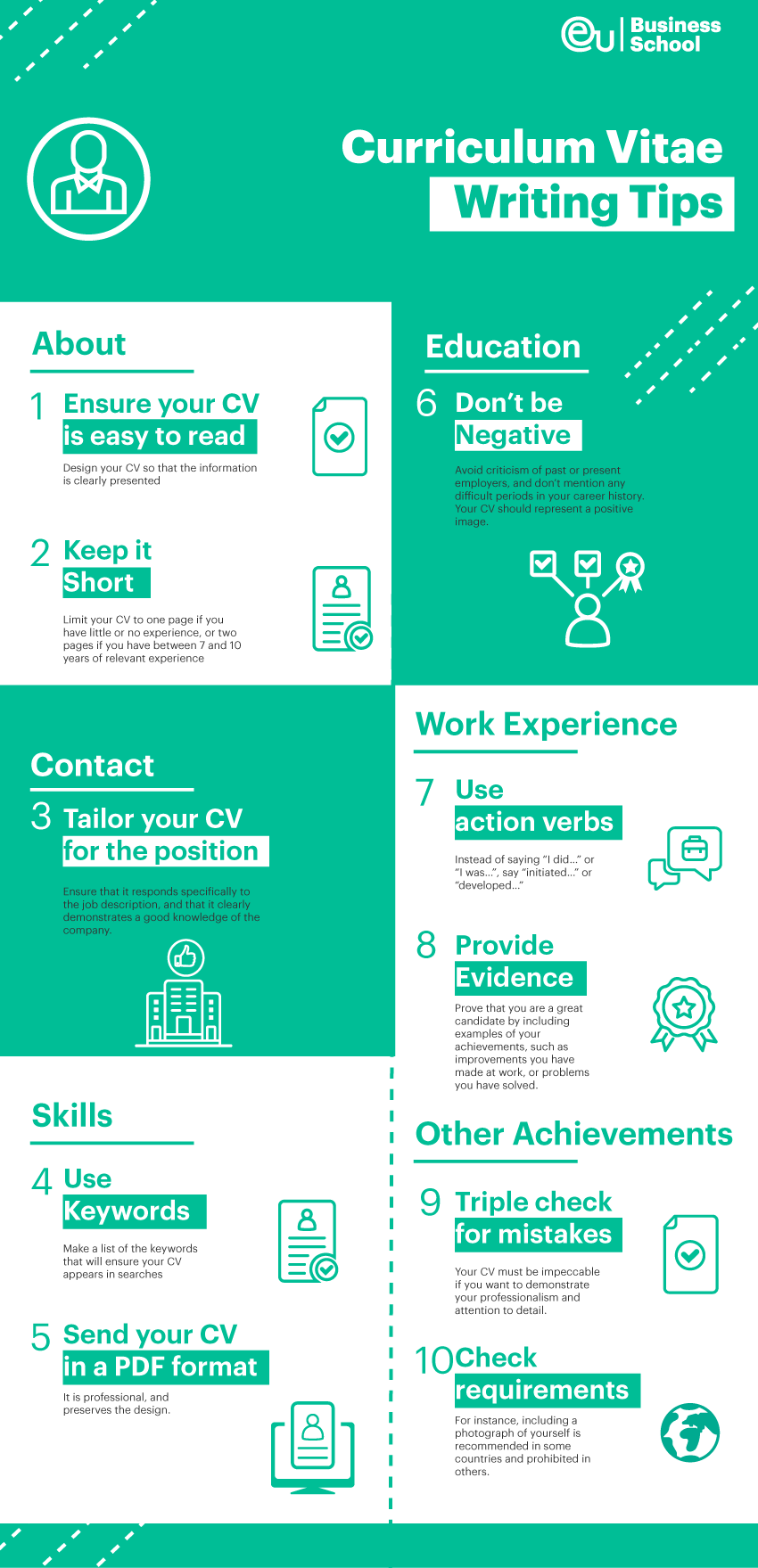A recruiter will spend six seconds on average looking at your CV, which means it is crucial it makes an impression at a glance. A good CV is key to getting you that all-important job interview.
This guide contains top tips and useful examples to help you build an effective CV.
Top 10 CV Tips
1. Ensure your CV is easy to read. Design your CV so that the information is clearly presented, allowing recruiters to see immediately that you have the right skills, experience and motivation for the job.
2. Keep it short. Limit your CV to one page if you have little or no experience, or two pages if you have between 7 and 10 years of relevant experience. Any longer than this and you may be waffling, but any shorter and you may not have provided enough information.
3. Always tailor your CV for the position and the company. Personalize your CV for each job: ensure that it responds specifically to the job description, and that it clearly demonstrates a good knowledge of the company.
4. Many recruiters use keywords to search for specific skills and qualifications on CVs. Make a list of the keywords that will ensure your CV appears in searches. Then find ways to include them, for example in past experience, skills and your personal statement.
5. Always send your CV in a PDF format. It is professional, and preserves the design.
6. Don’t be negative. Avoid criticism of past or present employers, and don’t mention any difficult periods in your career history. Your CV should represent a positive image.
7. When describing your previous roles, bullet points are most effective. Use action verbs. Instead of saying “I did…” or “I was…”, say “initiated…” or “developed…”
8. Provide evidence. Prove that you are a great candidate by including examples of your achievements, such as improvements you have made at work, or problems you have solved. You can also include certificates to show which skills you have acquired.
9. Your CV must be impeccable if you want to demonstrate your professionalism and attention to detail. Triple-check for spelling, grammar and formatting mistakes. You should also ask someone else to proofread it for you to avoid poor spelling, grammar or formatting. Just one mistake can mean your CV is immediately rejected.
10. Check country-specific CV requirements. For instance, including a photograph of yourself is recommended in some countries and prohibited in others.
Extra tip: Don’t lose motivation! Consult your career advisor if you’re not getting shortlisted despite sending many applications. Your CV might not be a good match for the roles for which you have been applying, or it is not doing your skills justice.
What to Include in Your CV?
- Basic Information
Include your e-mail address, cell phone number, and current place of residence. You can also include your availability and personal information such as your date of birth and nationality. Links to your social media accounts, such as LinkedIn, Twitter or your blog, can be included if they are professional and/or relevant to the position.
- Photo
If you include a photo on your CV, ensure that it is professional and high quality. You need to dress accordingly (think job interview). Note, however, some countries do not request or require a photo on a CV.
- Personal Statement
This is a short presentation of yourself to the company. Focus on the main value that you can provide to the organization (i.e. highlight the skills, experience, and motivation that you bring which are relevant to the role). Remember to tailor it to the job. It shouldn’t be longer than 50-200 words. You can provide more details on your cover letter. Here are some examples of personal statements:
“As a recent graduate from X University, with a degree in media communications, I have undertaken several internships within leading organizations such as Bertelsmann and Times Warner. These placements have enabled me to develop not only specific media industry experience, but also a valuable and transferable skill set in this fast-paced sector.”
“A recent business economics graduate from the University of X, I am looking to secure a graduate commercial analyst position to use and further develop my analytical skills and knowledge in a practical and fast-paced environment. My career goal is to assume a role which allows me to take responsibility for the analysis and interpretation of commercial data for a well-respected and market-leading company.”
“As a highly motivated and results-orientated manager within the luxury hotel sector, I have a proven track record of providing exemplary levels of service to a broad range of guests, including VIPs and high-profile individuals.”
(These examples are from The Independent and Reed.co.uk)
- Education
Include your completed or current degree studies, your school, dates, and location. Qualifications starting from tertiary level will be sufficient (always list most recent first). Under each degree, you can also include relevant courses and projects and other activities, such as being a class representative. This additional information is especially important if you don’t have work experience.
- Experience
Add any relevant experience in this section (starting with the most recent). This can include jobs, summer jobs, or internships. For each experience, include your position, the company name, dates, and location. Also list in bullet points your achievements and responsibilities in the role.
If you don’t have experience yet, put more focus on your education. You can also include a section for volunteer work, extracurricular activities, or other achievements. And if your only experience is a summer job selling ice cream, include it! It shows that you have held a job before and have learnt some transferrable skills (such as teamwork, customer service, or problem solving).
- Skills
Highlight the skills that are relevant to the position you are applying for. Always list your language skills as well as your computer skills, and be sure to include your level in each of them.
- Other Achievements
Include any volunteering, additional achievements or extracurricular activities. These could include certificates for skills related to the position, volunteering, if you are a member of any sports teams, or participating in a MUN.
- References
Add professional references at the end of your CV. If you haven’t worked before, you could include academic references. Remember to ask for permission before sharing contact information for the colleagues or academics providing references. You could also just say “References are available upon request.”
CV Examples
View an example of a bachelor’s student’s CV and a master’s/MBA student’s CV.













